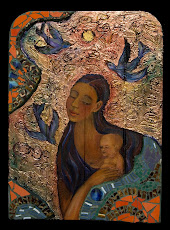So I grew up referring to her as my "Spanish Grandmother" when I didn't call her Abuelita (the Spanish word for grandmother). Her name was Catalina Maria Ortiz Acosta and she was a renaissance women who was very cultured and talented. I put together an essay on my site describing her contribution to the classical music scene in Southern California circa the 1920's. I also submitted it to LatinoLA and they published it also.
Here's the beginning of the article and a photo of my grandmother: The article is titled, "My Abuelita was One Talented Mujer (Woman)
Multi-Cultural Chicano Musical History in Southern California with Classical Music Indianist Composer and Chicana Pianists in LA
Los Angeles during the early 1900's was not a friendly place for Mexican-Americans and Chicanos. Though originally part of Mexico, California was annexed by Anglos to become part of the United States of America in 1848. With the gold rush of 1842 and other immigration, the existing American Indian and Spanish / Mexican people of California were politically and socially marginalized. By the 1920's lynchings, racially motivated attacks and "anti-greaser" laws were in place to control and dominate the Mexican American (Chicano) population of California. Pressure on Mexican Americans increased and included segregated schools in areas of Southern California where large groups of Chicanos persisted. The famous case, Mendez vs. the Board of Education finally ended Hispanic segregation in the late 1950's.
Intelligent, cultured and talented Hispanic Americans were not lauded. In fact, with the veil of racism over many Anglo peoples perceptions during that era, there was very limited press coverage of the positive cultural contributions of Chicanos in Los Angeles. History is written by the "winners", and as a conquered population, Spanish / Mexican Californians have lost many of their historical cultural contributions to a lack of attention.
As a third generation Californian (I now live in Oregon), I found some Chicana history within my family that pertains to the larger political climate and the cultural life of elite Angelinos during the early part of the twentieth century. In the early 1920's my grandmother Catalina Maria Ortiz Acosta and her family, lived in Los Angeles. The last of eighteen children, my grandmother Catalina was the daughter of J. Nestor Ortiz and Maria Salazar Ortiz. J. Nestor was a wealthy man who had owned several businesses and a sheep ranch in the town of Ortiz, Colorado (near Antonito, on the border with New Mexico). J. Nestor sold his interests in Colorado and re-located in Los Angeles, California in 1903. Catalina was born the next year. Though her ancestors where among the founding families of Santa Fe, New Mexico (and other towns in the region), she would often refer to herself and family members as "Californios" or "Spanish". Either were terms that people (Anglo and Hispanic) in her generation used to refer to the Spanish families that lived in the American Southwest when that region was under the control of Spain/Mexico. Because she was born in California, the term "Californio(a)" is accurate, but not completely reflective of her cultural heritage. The term she used usually depended upon her sense of the listener's knowledge of these finer points of cultural history.
Though the term Californio/a is dated and not used today, it was very meaningful for Spanish citizens of California who became citizens of the United States because of the Mexican War in 1848. My grandmother would often express her indignation towards prejudice that any family member encountered with the comment, "Those peasants don't realize that we are Californios." I smile when I think about that. She disdained the prejudice that she deemed more a result of a lack of a good education than a lack of kindness. (I'm including this information about her cultural ethnic appellation because you will note that the concert program below refers to her as a "Spanish-American Pisaniste".)
The Ortiz family befriended Charles O. Roos and his wife, Jaunita E. Roos. The family connection was certainly enriched by Catalina's friendship and professional relationship with Jaunita. Catalina (1904-1991) was then a twenty year old classical pianist and the featured pianist at concerts the Roos organized. My grandmother spoke with admiration regarding Juanita's musical abilities. Charles, an Easterner, moved to Los Angeles and worked as a newspaper feature writer when not involved with his work as a lyricist. His wife Juanita was a gifted pianist. They collaborated to create a variety of piano compositions. Charles also wrote poems and lyrics for other composers' music. The concert program for the event at the Ramona Convent in Alhambra, California illustrates the typical concert Roos organized. Nordskog Records recorded the concert. Unfortunately, I don't have a copy of that recording or know of it's existence.
Sifting through my Grandmother's photo albums I found several photos of Charles and Juanita. The photos of the people in the Native American outfits are my grandmother Catalina, and Chief Yowlache, dressed in traditional Native American clothing for publicity photos that Roos used in his concert promotions. Chief Yowlache was the "Indian baritone" for the program. Catalina accompanied him and also played solos.
During a time of escalating social injustice. . . READ MORE.
NOTE: All photos copyright Cristina Acosta.















Dear Cristina,
ReplyDeleteI was very touched by the outstanding, loving article of your abuelita. The memory of my mother, who I lost 3 years ago, has served as my inspiration in almost everything I do. Thanks to her, I got over my shyness and started a Mexican cooking blog. It has opened up another world to me.
What a wonderful blog you have!!
ReplyDeleteHere's the address -- http://tazadechocolate.blogspot.com/